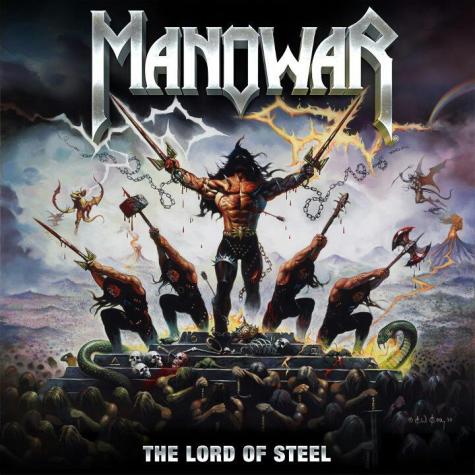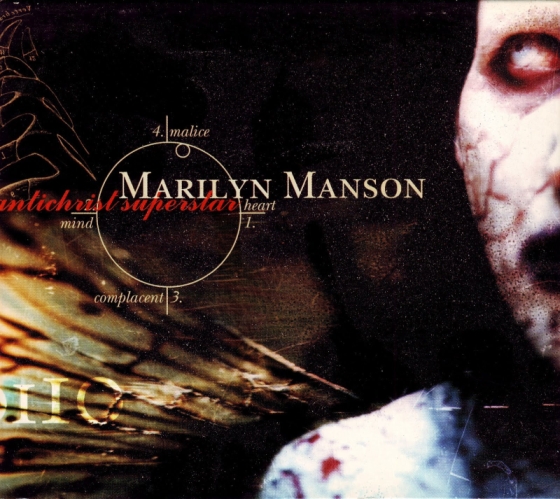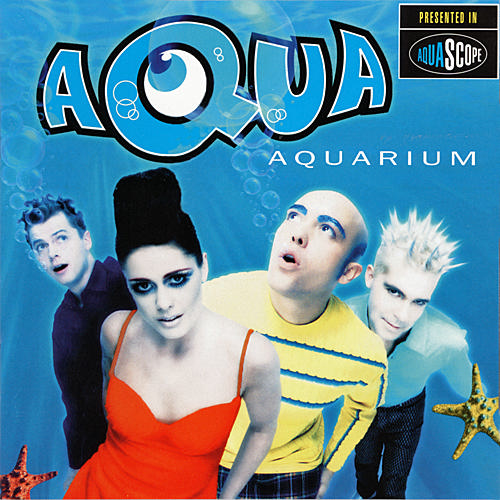 Magic Eye images show you one image at a casual glance, and another image if you focus on them at length. Manowar is the Magic Eye of metal. Their official image is of a goofy retro metal band that take themselves too seriously. But study the band at length and the facade cracks, and you see the disturbing truth, the band is the personal bondage gimp of bassist Joey DeMaio.
Magic Eye images show you one image at a casual glance, and another image if you focus on them at length. Manowar is the Magic Eye of metal. Their official image is of a goofy retro metal band that take themselves too seriously. But study the band at length and the facade cracks, and you see the disturbing truth, the band is the personal bondage gimp of bassist Joey DeMaio.
In the 90s, drummer Scott Columbus took a nearly 6 year hiatus from the band, with Joey DeMaio making a statement that Scott had to care for his sick son. In retrospect, this seems to have been a cover story, maybe because DeMaio thought that the revelation of internal stife could hurt the band’s image (“Brothers of Metal” etc). Columbus passed away in 2011, leaving behind an interview titled Why I Left Manowar. “My son was never sick. […] deduce from that what you may.”
In 2002 DeMaio launched Magic Circle Music, a label for “true metal” artists. Rhapsody of Fire released two albums on the label, and then the partnership went down in a snarl of legal tangles (they even called out DeMaio by name in a Myspace blog). Labelmate Holyhell seems to be in about the same place (Recent quote from their frontwoman’s Facebook: “every storm runs out of rain….and every demon runs out of fire…….I will not give up on HolyHell, nor lose my smile in this dark mess.”)
Another storied Magic Circle Music release was a Ronnie James Dio “tribute” album rushed out to market less than a month after the legendary vocalist died. Manowar covered “Heaven and Hell” for the album, and DeMaio did a number of interviews where he talked about the friendship he and Dio had shared. Wendy Dio soon released a statement saying that although DeMaio and Dio had met, they were not friends.
And then there’s Manowar’s music itself. The band appears to be barely functioning, playing a handful of tour dates a year and releasing tepid albums with the irregularity and discomfort of a cat gagging up a furball. DeMaio patches up the gaps with an Iron Maiden-esque plethora of live albums, concert DVDs, re-releases, and re-recordings. 2007 saw the launch of The Asgard Saga, purportedly a Manowar-based multimedia franchise containing games, movies, and books. Six years later and the project is deader than disco. DeMaio promised a new album in 2010 called Hammer of the Gods…and then made a video announcing he had thrown the album out and was starting again. Nothing DeMaio says can be relied upon, he makes promises out of one side of his mouth while saying “oops” out of the other.
I go on this lengthy spiel only to illustrate why the band seems curiously depleted from its heyday in the 80s. Manowar barely is a band anymore! It’s just a DeMaio doing everything, with a few glorified backup musicians that he has the nerve to call bandmates. Brothers of metal will always be there, standing together with hands in the air..
When I listened to The Lord of Steel (the latest in Manowar’s backbreaking two-albums-per-decade schedule), a few things stood out.
1. The production is very bad.
2. There’s less orchestra and more actual metal
3. The lyrics are very bad.
4. The songs are catchy and bombastic, however
5. The soul of old-school Manowar is not present
1. DeMaio promised that the bass on this album would be super-heavy, and that turned out the same as many of his promises. The early “Hammer Edition” release of LOTR contains the most abusive and awful bass sound I can recall hearing on a professionally recorded metal album, an over-distorted “bzzz-bzzz-bzzz” sound that sounds like bees pinging around inside a sewer pipe. The later “Steel Edition” smooths out the bass a bit, but it’s still muddy as fuck and sits uncomfortably in the mix. The album in general has a “digital” sound that I’m not partial too, with the drums sounding obviously quantized in places.
2. The orchestration is greatly scaled back from past albums, and replaced with guitars and whatnot. It’s hard to assess whether this is a positive change. No question: Warriors of the World and Gods of War went far overboard, but they had a grandiosity that’s missing here. Maybe it’s not an issue of what they took out, but what they added in. I wish LOS had more raging fast songs like “God or Man”. The whole album seems slow.
3. The lyrics hit a new low. You may be thinking that this band always had bad lyrics, but no, they had enthusiastic bad lyrics. “May your sword stay wet like a young girl in her prime” made me cringe, but it also made me smile. This has lazy, don’t-give-a-shit bad lyrics. “For the glory of battle I will fight until I die / Live one day as an eagle or a lifetime as a fly!” “Never gonna change our style / Gonna play tonight for quite a while!” “I get professional pay / To make people go away!” A Dr Seuss exercise in grabbing whatever word will rhyme, in other words (I wish there were other words).
4. However, the songs are actually pretty good. The title track is as powerful as a charging bull, and “Touch the Sky” is extremely catchy and memorable. “Black List” is a six and a half minute trudge through, reminding of Sabbath-inspired crushers from the old days such as “The Demon’s Whip”. The Steel Edition of the album features a fascinating epic ballad titled “The Kingdom of Steel”, which features DeMaio playing classically-inspired melodies on a piccolo bass.
5. Yet Manowar still fails to recapture the glory they had on their early releases. Old Manowar had something beyond catchy songs and annoying bass tracks. They had a heart. Even when DeMaio was being his usual self (10 minute long bass solos and what have you), there was an irresistible charm to the music that caused it to transcend its own stupidity.
Concerning though it is that DeMaio might be choking the life out of this band, there’s a more disturbing option: that the band by rights should have died years ago, and DeMaio has it hooked up on life support. He does nearly everything. He writes the songs, writes the lyrics, does the production, does 95% of the marketing (when was the last time you saw a Manowar member except DeMaio give an interview?), and so on.
Maybe I was wrong to call Manowar a Magic Eye. They’re more like a Joey DeMaio Mandelbrot set. No matter how deep you go, it’s just DeMaio DeMaio DeMaio, all day and every day. Manowar isn’t a band of true metal brothers. It’s a dead horse being kept alive by the most out of control egomaniac in rock and roll.


